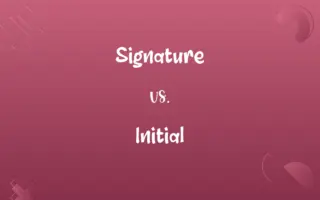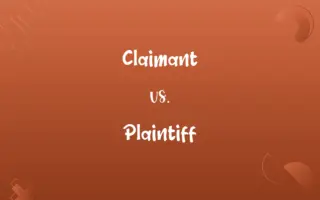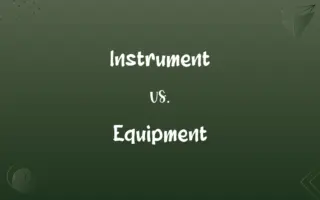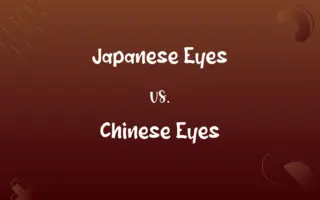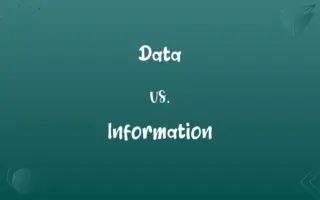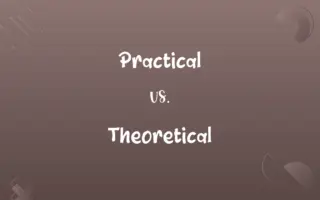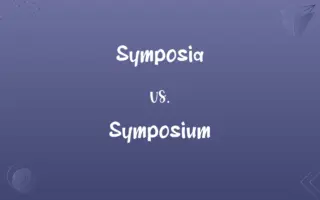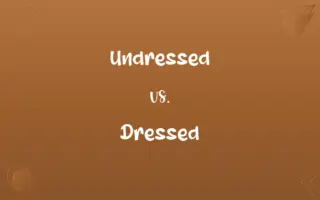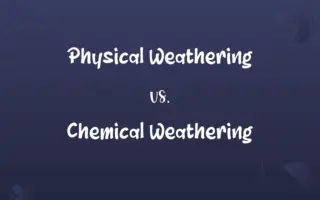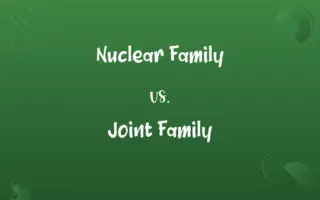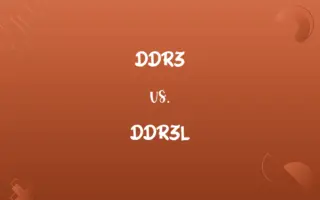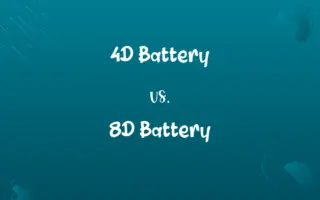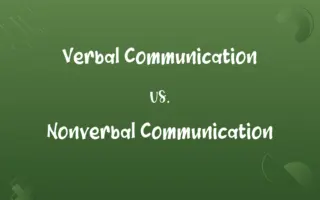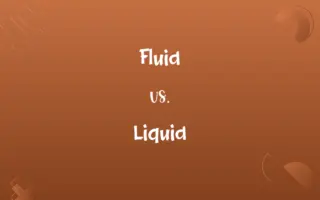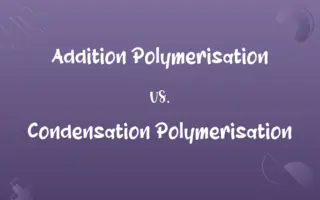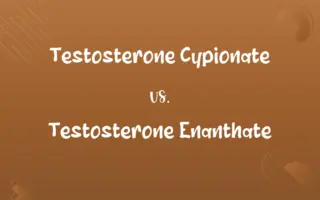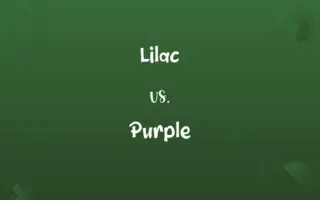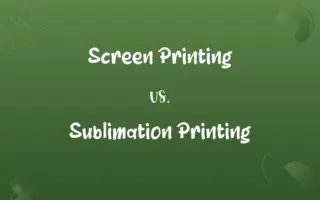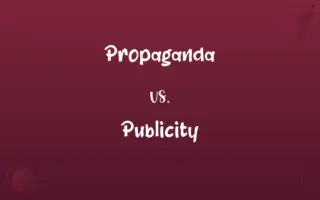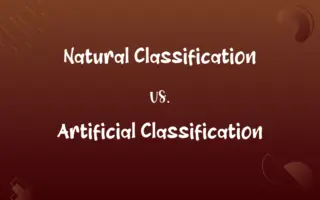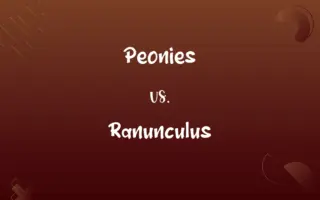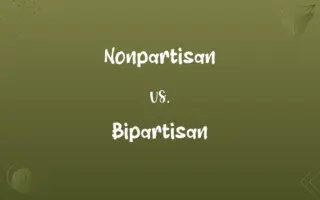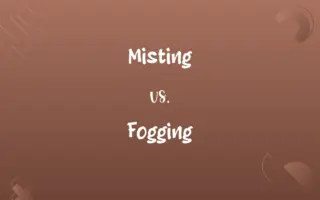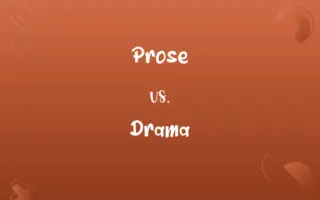Principle vs. Theory: Know the Difference

By Shumaila Saeed || Updated on December 25, 2023
Principle refers to a basic truth or proposition that forms the foundation for a belief or action. A theory is a set of ideas or a supposition designed to explain something, which is based on general principles but is independent of the specific item.
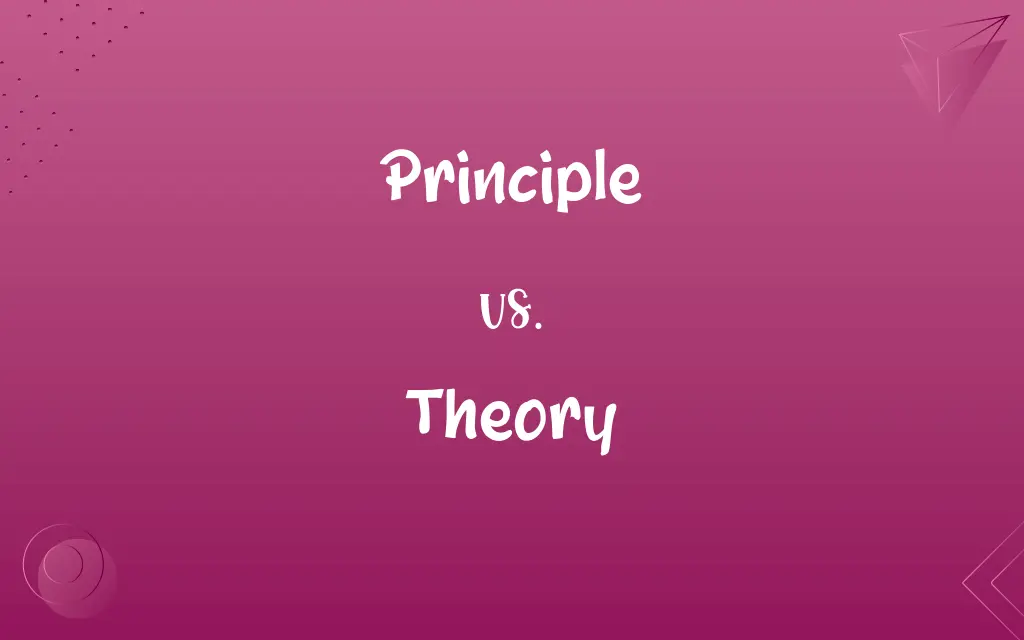
Key Differences
Principle refers to a foundational belief or rule that guides behavior or reasoning, often seen as a truth. Theory, on the other hand, is an explanation or model based on observation, experimentation, and reasoning, especially one that has been tested and confirmed as a general principle helping to explain and predict natural phenomena.
Shumaila Saeed
Nov 10, 2023
A principle is typically used as a guideline or standard, forming the basis of a system of thought or behavior. It's often seen as immutable and universal. A theory, however, is a logical explanation of occurrences or phenomena that has been repeatedly tested and validated through scientific methods.
Shumaila Saeed
Nov 10, 2023
Principles often serve as the underpinning for moral or ethical decision-making and are seen as constants in human behavior. Theories are more fluid, subject to change as new information and evidence are presented. They are tools for understanding and predicting phenomena within a specific domain.
Shumaila Saeed
Nov 10, 2023
In principle, we find a rule or idea that forms the basis of something, often reflecting values or ethics. Theories, however, are frameworks for understanding the world that are empirically tested and refined over time through research and experimentation.
Shumaila Saeed
Nov 10, 2023
While principles are foundational and normative, often applied in moral or ethical dilemmas, theories are descriptive, explaining how and why things happen. Principles guide actions and beliefs, while theories provide an understanding and explanation of observable phenomena.
Shumaila Saeed
Nov 10, 2023
ADVERTISEMENT
Comparison Chart
Definition
A basic truth or law that guides beliefs/actions
A hypothesis or set of ideas explaining phenomena
Shumaila Saeed
Nov 10, 2023
Nature
Often immutable, ethical, or moral standards
Subject to testing and revision, explanatory
Shumaila Saeed
Nov 10, 2023
Application
Guides behavior and decision-making
Explains and predicts events or behaviors
Shumaila Saeed
Nov 10, 2023
Basis
Rooted in values and ethics
Based on empirical evidence and observation
Shumaila Saeed
Nov 10, 2023
ADVERTISEMENT
Principle and Theory Definitions
Principle
A fundamental truth serving as the foundation for a system of belief.
Honesty is a principle that guides my actions in life.
Shumaila Saeed
Nov 10, 2023
Theory
An idea used to account for a situation or justify a course of action.
Her theory was that more sleep would improve her concentration.
Shumaila Saeed
Nov 10, 2023
Principle
A rule or belief governing one's personal behavior.
Following the principle of fairness, she divided the cake equally.
Shumaila Saeed
Nov 10, 2023
Theory
A hypothesis assumed for the sake of argument or investigation.
In theory, the plan should work, but it’s yet to be tested.
Shumaila Saeed
Nov 10, 2023
Principle
A general scientific theorem or law presenting considerable evidence.
The principle of gravity explains why objects fall towards the earth.
Shumaila Saeed
Nov 10, 2023
ADVERTISEMENT
Theory
An abstract thought or speculation.
His theory about time travel was intriguing but unproven.
Shumaila Saeed
Nov 10, 2023
Principle
A moral rule or belief about what is right and wrong.
He refused to lie, standing by his principles of honesty.
Shumaila Saeed
Nov 10, 2023
Theory
A set of principles on which the practice of an activity is based.
His investment decisions are based on economic theory.
Shumaila Saeed
Nov 10, 2023
Theory
A supposition or system of ideas explaining something.
Einstein's theory of relativity revolutionized physics.
Shumaila Saeed
Nov 10, 2023
Principle
A rule or standard, especially of good behavior
A man of principle.
Shumaila Saeed
Oct 19, 2023
Theory
A set of statements or principles devised to explain a group of facts or phenomena, especially one that has been repeatedly tested or is widely accepted and can be used to make predictions about natural phenomena.
Shumaila Saeed
Oct 19, 2023
Principle
The collectivity of moral or ethical standards or judgments
A decision based on principle rather than expediency.
Shumaila Saeed
Oct 19, 2023
Theory
The branch of a science or art consisting of its explanatory statements, accepted principles, and methods of analysis, as opposed to practice
A fine musician who had never studied theory.
Shumaila Saeed
Oct 19, 2023
Theory
A set of theorems that constitute a systematic view of a branch of mathematics.
Shumaila Saeed
Oct 19, 2023
Principle
A basic or essential quality or element determining intrinsic nature or characteristic behavior
The principle of self-preservation.
Shumaila Saeed
Oct 19, 2023
Theory
Abstract reasoning; speculation
A decision based on experience rather than theory.
Shumaila Saeed
Oct 19, 2023
Principle
A rule or law concerning the functioning of natural phenomena or mechanical processes
The principle of jet propulsion.
Shumaila Saeed
Oct 19, 2023
Theory
A belief or principle that guides action or assists comprehension or judgment
Staked out the house on the theory that criminals usually return to the scene of the crime.
Shumaila Saeed
Oct 19, 2023
Principle
(Chemistry) One of the elements that compose a substance, especially one that gives some special quality or effect.
Shumaila Saeed
Oct 19, 2023
Theory
An assumption based on limited information or knowledge; a conjecture.
Shumaila Saeed
Oct 19, 2023
Theory
A description of an event or system that is considered to be accurate.
Shumaila Saeed
Oct 19, 2023
Principle
A fundamental assumption or guiding belief.
We need some sort of principles to reason from.
Shumaila Saeed
Oct 19, 2023
Theory
(sciences) A coherent statement or set of ideas that explains observed facts or phenomena and correctly predicts new facts or phenomena not previously observed, or which sets out the laws and principles of something known or observed; a hypothesis confirmed by observation, experiment etc.
Shumaila Saeed
Oct 19, 2023
Principle
A rule used to choose among solutions to a problem.
The principle of least privilege holds that a process should only receive the permissions it needs.
Shumaila Saeed
Oct 19, 2023
Theory
(uncountable) The underlying principles or methods of a given technical skill, art etc., as opposed to its practice.
Shumaila Saeed
Oct 19, 2023
Principle
Moral rule or aspect.
I don't doubt your principles.
You are clearly a person of principle.
It's the principle of the thing; I won't do business with someone I can't trust.
Shumaila Saeed
Oct 19, 2023
Theory
(mathematics) A field of study attempting to exhaustively describe a particular class of constructs.
Knot theory classifies the mappings of a circle into 3-space.
Shumaila Saeed
Oct 19, 2023
Principle
(physics) A rule or law of nature, or the basic idea on how the laws of nature are applied.
Bernoulli's Principle
The Pauli Exclusion Principle prevents two fermions from occupying the same state.
The principle of the internal combustion engine
Shumaila Saeed
Oct 19, 2023
Principle
A fundamental essence, particularly one producing a given quality.
Many believe that life is the result of some vital principle.
Shumaila Saeed
Oct 19, 2023
Theory
A set of axioms together with all statements derivable from them; or, a set of statements which are deductively closed. Equivalently, a formal language plus a set of axioms (from which can then be derived theorems). The statements may be required to all be bound (i.e., to have no free variables).
A theory is consistent if it has a model.
Shumaila Saeed
Oct 19, 2023
Principle
A source, or origin; that from which anything proceeds; fundamental substance or energy; primordial substance; ultimate element, or cause.
Shumaila Saeed
Oct 19, 2023
Theory
A doctrine, or scheme of things, which terminates in speculation or contemplation, without a view to practice; hypothesis; speculation.
Shumaila Saeed
Oct 19, 2023
Theory
An exposition of the general or abstract principles of any science; as, the theory of music.
Shumaila Saeed
Oct 19, 2023
Theory
The science, as distinguished from the art; as, the theory and practice of medicine.
Shumaila Saeed
Oct 19, 2023
Theory
The philosophical explanation of phenomena, either physical or moral; as, Lavoisier's theory of combustion; Adam Smith's theory of moral sentiments.
Shumaila Saeed
Oct 19, 2023
Principle
(transitive) To equip with principles; to establish, or fix, in certain principles; to impress with any tenet or rule of conduct.
Shumaila Saeed
Oct 19, 2023
Theory
A well-substantiated explanation of some aspect of the natural world; an organized system of accepted knowledge that applies in a variety of circumstances to explain a specific set of phenomena;
Theories can incorporate facts and laws and tested hypotheses
True in fact and theory
Shumaila Saeed
Oct 19, 2023
Theory
A tentative theory about the natural world; a concept that is not yet verified but that if true would explain certain facts or phenomena;
A scientific hypothesis that survives experimental testing becomes a scientific theory
He proposed a fresh theory of alkalis that later was accepted in chemical practices
Shumaila Saeed
Oct 19, 2023
Principle
A source, or origin; that from which anything proceeds; fundamental substance or energy; primordial substance; ultimate element, or cause.
The soul of man is an active principle.
Shumaila Saeed
Oct 19, 2023
Theory
A belief that can guide behavior;
The architect has a theory that more is less
They killed him on the theory that dead men tell no tales
Shumaila Saeed
Oct 19, 2023
Principle
An original faculty or endowment.
Nature in your principles hath set [benignity].
Those active principles whose direct and ultimate object is the communication either of enjoyment or suffering.
Shumaila Saeed
Oct 19, 2023
Principle
A fundamental truth; a comprehensive law or doctrine, from which others are derived, or on which others are founded; a general truth; an elementary proposition; a maxim; an axiom; a postulate.
Therefore, leaving the principles of the doctrine of Christ, let us go on unto perfection.
A good principle, not rightly understood, may prove as hurtful as a bad.
Shumaila Saeed
Oct 19, 2023
Principle
A settled rule of action; a governing law of conduct; an opinion or belief which exercises a directing influence on the life and behavior; a rule (usually, a right rule) of conduct consistently directing one's actions; as, a person of no principle.
All kinds of dishonesty destroy our pretenses to an honest principle of mind.
Shumaila Saeed
Oct 19, 2023
Principle
Any original inherent constituent which characterizes a substance, or gives it its essential properties, and which can usually be separated by analysis; - applied especially to drugs, plant extracts, etc.
Cathartine is the bitter, purgative principle of senna.
Shumaila Saeed
Oct 19, 2023
Principle
To equip with principles; to establish, or fix, in certain principles; to impress with any tenet, or rule of conduct, good or ill.
Governors should be well principled.
Let an enthusiast be principled that he or his teacher is inspired.
Shumaila Saeed
Oct 19, 2023
Principle
A basic generalization that is accepted as true and that can be used as a basis for reasoning or conduct;
Their principles of composition characterized all their works
Shumaila Saeed
Oct 19, 2023
Principle
A rule or standard especially of good behavior;
A man of principle
He will not violate his principles
Shumaila Saeed
Oct 19, 2023
Principle
A rule or law concerning a natural phenomenon or the function of a complex system;
The principle of the conservation of mass
The principle of jet propulsion
The right-hand rule for inductive fields
Shumaila Saeed
Oct 19, 2023
Principle
(law) an explanation of the fundamental reasons (especially an explanation of the working of some device in terms of laws of nature);
The rationale for capital punishment
The principles of internal-combustion engines
Shumaila Saeed
Oct 19, 2023
Principle
A fundamental source or basis of something.
The principles of democracy are liberty and justice for all.
Shumaila Saeed
Nov 10, 2023
Repeatedly Asked Queries
What is a theory?
A theory is a supposition or system of ideas intended to explain something, often based on empirical evidence.
Shumaila Saeed
Nov 10, 2023
How do principles differ from theories?
Principles are foundational beliefs or rules, while theories are explanations or models based on observation and testing.
Shumaila Saeed
Nov 10, 2023
What is a principle?
A principle is a fundamental truth or proposition that serves as the foundation for a system of belief or behavior.
Shumaila Saeed
Nov 10, 2023
Do theories change over time?
Yes, theories can evolve with new evidence and research.
Shumaila Saeed
Nov 10, 2023
Is a principle always true?
In the context in which it is applied, a principle is generally considered a foundational truth.
Shumaila Saeed
Nov 10, 2023
Are principles always morally based?
Often, but not always. Principles can also be fundamental truths or laws in science.
Shumaila Saeed
Nov 10, 2023
Why are principles important?
They guide ethical and moral behavior, decision-making, and belief systems.
Shumaila Saeed
Nov 10, 2023
Can a theory become a principle?
Not typically; theories explain phenomena, while principles are foundational truths or rules.
Shumaila Saeed
Nov 10, 2023
Can theories be proven?
Theories can be supported by evidence but are always open to revision and refinement.
Shumaila Saeed
Nov 10, 2023
Are all theories scientific?
Most theories, especially in the context of this discussion, are scientific, but the term can also refer to non-scientific ideas.
Shumaila Saeed
Nov 10, 2023
Is gravity a principle or a theory?
Gravity is a principle explained by the theory of general relativity.
Shumaila Saeed
Nov 10, 2023
How do principles affect our lives?
They influence our behavior, choices, and interactions with others.
Shumaila Saeed
Nov 10, 2023
Can a principle be subjective?
Some principles, especially ethical ones, can be subjective and vary between cultures.
Shumaila Saeed
Nov 10, 2023
Can principles be universal?
Some principles, like those in physics, are universal, while others may vary culturally.
Shumaila Saeed
Nov 10, 2023
What is an example of a theory in everyday life?
The germ theory of disease explains how illnesses are caused by microorganisms.
Shumaila Saeed
Nov 10, 2023
Can theories be disproven?
Yes, theories can be disproven or modified with new evidence.
Shumaila Saeed
Nov 10, 2023
Are principles always based on facts?
Principles can be based on ethical beliefs or factual truths, depending on their context.
Shumaila Saeed
Nov 10, 2023
Why are theories important?
They help us understand, explain, and predict phenomena in various fields.
Shumaila Saeed
Nov 10, 2023
How do we test a theory?
Through observation, experimentation, and empirical evidence.
Shumaila Saeed
Nov 10, 2023
What's an example of a principle in everyday life?
The principle of treating others as you want to be treated guides interpersonal behavior.
Shumaila Saeed
Nov 10, 2023
Share this page
Link for your blog / website
HTML
Link to share via messenger
About Author
Written by
Shumaila SaeedShumaila Saeed, an expert content creator with 6 years of experience, specializes in distilling complex topics into easily digestible comparisons, shining a light on the nuances that both inform and educate readers with clarity and accuracy.
